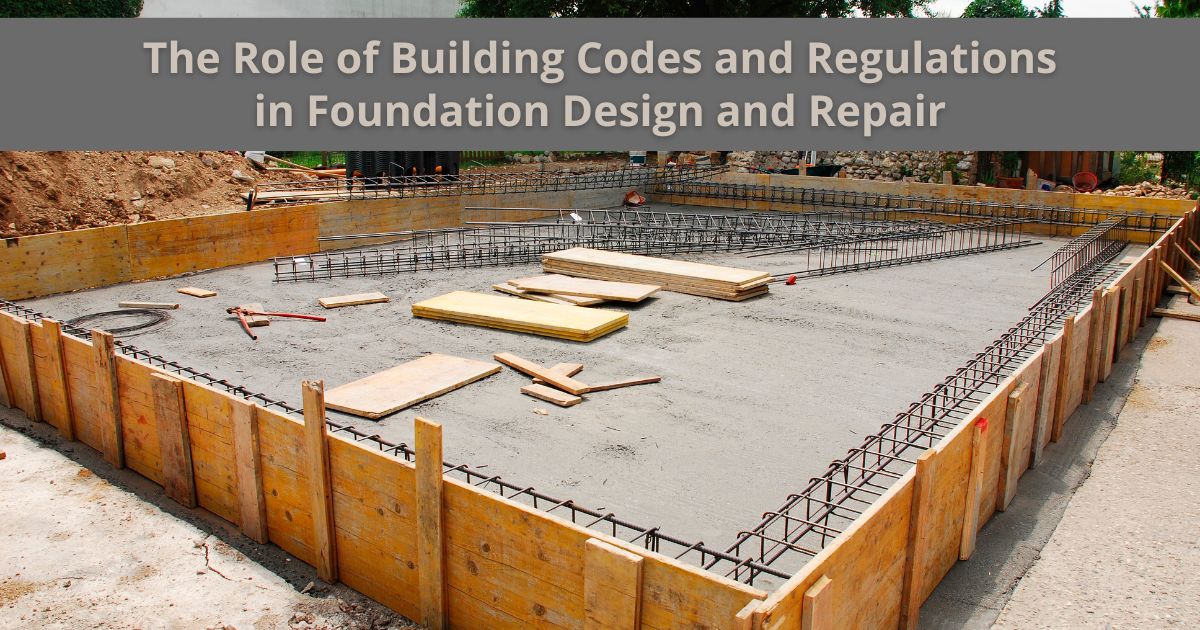512.291.0709
Mon - Fri: 9 AM - 11:30 AM
12:30 PM - 4 PM
April 26, 2023

Whether you’re building a new foundation from scratch or you’re trying to repair an older one, you’ll have to make sure your project sticks to all applicable building codes and regulations. This can certainly make the work feel more daunting, but it serves an essential purpose.
Building codes and regulations play a crucial role in foundation design and repair. These official rules are established to ensure that buildings are constructed safely and strong enough to withstand a variety of natural and man-made hazards. Since foundations are the main support structure for the rest of the build, it’s easy to see why it’s so essential to get them right!
These standards also provide guidance on the appropriate design, materials, and installation and repair techniques that must be used. Specific requirements include size dimensions, strength levels, below-ground depth, and the type and condition of the soil on which the foundation is built.
Also dictated are any permits or approvals needed before beginning work. Since only properly-licensed contractors and individuals can obtain these, this guarantees your work is performed by someone qualified.
Ensuring adherence to building codes and regulations may require regular inspections and maintenance of building foundations. Adhering to a set routine for inspections can help identify potential problems early, before they’ve caused excessive damage.
With both of the above factors accounted for, codes and regulations effectively reduce the likelihood that your foundation will have problems later on. This makes the invested time, effort, and money well worth it, as you’ll be able to avoid expensive remediation down the road.
Never underestimate the number of rules and authorities that must be heeded in construction. If your project is located in the Austin, TX area, then you’ll need to abide by all of the following:
International Building Code (IBC): The IBC sets minimum requirements for building design, construction, and maintenance, including foundation design and repair. A number of subsidiary code sets are part of the IBC, each addressing specific domains of construction.
International Residential Code (IRC): The IRC is applicable for housing, with requirements for the construction and repair of foundations for one- and two-family dwellings.
International Existing Building Code (IEBC): The IEBC regulates the repair and alteration of existing buildings, with rules that apply to foundations.
International Energy Conservation Code (IECC): The IECC requires foundations to meet minimum standards for energy-efficient design and construction.
International Plumbing Code (IPC): The IPC covers plumbing systems, extending to foundation drainage.
International Mechanical Code (IMC): The IMC lays out rules for any mechanical systems used in foundation ventilation.
International Fire Code (IFC): The IFC establishes foundation construction and repair guidelines that ensure fire safety for the entire building.
City of Austin Code: The City of Austin acts as the local authority, with its own specific code requirements for foundation work, such as soil testing, foundation design, and drainage requirements. All standards are set to address the unique soil conditions, weather patterns, and typical building types found in Austin.
If your foundation doesn’t meet all of the applicable code requirements, you can find yourself in quite the predicament.
Your construction or repair project is likely to fail the legally-required inspection administered by the City. Failure can result in a stop-work order, grinding your entire project to a halt. You’ll be required to correct the foundation issues before proceeding with other construction or renovation work.
That’s not the only inspection you’ll have to worry about. When the time comes to sell your home, most buyers will want to exercise their right to a home inspection. If their inspection uncovers code issues in your foundation, it may be difficult to convince the buyer your home is still worth closing on.
Finally, code-flouting foundations are prone to causing damage, which can present danger of both the physical and legal sort. Should your foundation cause harm to your property or to any neighboring properties, you may be held liable for any resulting damages. Additionally, any structural instability will pose a safety hazard, increasing the risk of someone being hurt. Both of these scenarios can result in serious legal and financial consequences, such as lawsuits and insurance claims.
Thankfully, code compliance isn’t a worry when you’re working with a team of true foundation professionals. Here at Douglas Foundation Repair, we’ve helped countless homeowners throughout Austin get their builds and repairs done by the book, allowing them to pass inspections without a fuss. Our knowledgeable team is savvy on all of the standards that apply, with mastery of the techniques and solutions needed to achieve a code-approved foundation.
If you’re ready to discuss your foundation repair or construction project, contact us today. We’ll send one of our specialists out to conduct a free evaluation, giving you all the insight you need to decide the next steps.